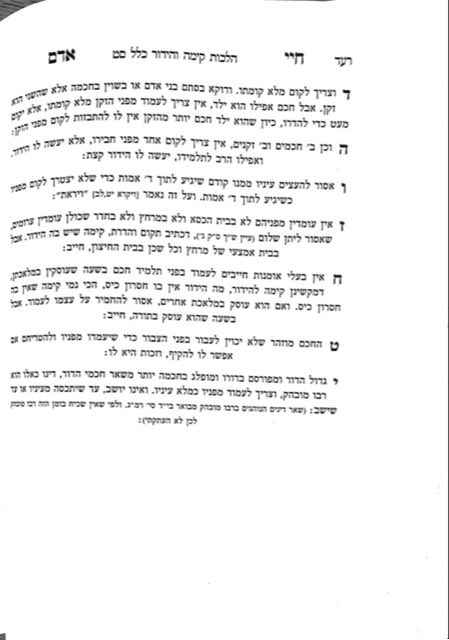We are discussing the halachos of kavod talmidei chachamim. Today, we will discuss the halachos of a seivah. We learned (shiur 1484) that it is a machlokes whether seivah begins at age 60 or 70, and since this is a question of a chiyuv deoraysa, one should be machmir. Although we learned (shiur 1487) that one can assume the seivah is mochel, one should show them some elements of hiddur in order to acknowledge their presence. These halachos apply equally to a female seivah as well.
We learned about giving a non-Jewish seviah kavod as well (shiur 1484). The Gemara says that Rav Yochanan would give such non-Jews kavod, because kama harpatkei avru lehai inish, they have experienced so many life experiences that it is appropriate to give them kavod. Some poskim hold that it only applies to a non-Jew who keeps the 7 mitzvos bnei noach, and therefore it is uncommon to need to give kavod to a non-Jewish seivah nowadays. However, there is also a concept of giving kavod due to darchei shalom, even without a chiyuv gamur.
Part of the kavod given to a seivah is to talk to them in an appropriate fashion. One must address them with an appropriate title, such as Mr. or Mrs. In regards to offering assistance, a person should offer to help even if the seivah will not accept it, as there is an element of respect expressed simply by offering the assistance.
We touched on the question of whether one is chayav to give up their seat (e.g., on the bus) for a seivah (shiur 1494). Many poskim hold that one must give up their seat, as it is a lack of kavod for one to be sitting while they are standing. A person should offer their seat to someone who is elderly.
In a similar fashion to one’s parents, the concept of disagreeing with the words of the seivah is a lack of kavod. One does not have to agree with what the seivah is saying, but dismissing his words out of hand would be a lack of kavod.
Summary
- The halachos of kavod for a seivah apply equally a male and female seivah.
- Even though there is an assumption that they are mochel, one should still show them some elements of hiddur, such as addressing them with proper titles, offering them assistance, giving up their seat for them, and not disagreeing explicitly with their words.
- It is appropriate to show non-Jewish seivah kavod as well. Many poskim hold the chiyuv only applies to a seivah who keeps the 7 mitzvos bnei noach, but even if it is not a chiyuv, it is still appropriate to give them kavod due to darchei shalom.



